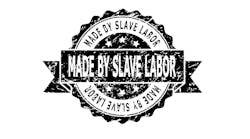Commentary/Analysis
Eliminating forced labor from the supply chain was one of the resolutions adopted by the leaders of the G-7 nations at their most recent meeting, in what is seen as an attempt to confront China over terrible conditions it has imposed on minorities in that country.
The joint communique was released at the conclusion of the summit and was signed by the heads of state of the United Kingdom, Canada, Italy, France, Japan, Germany and the United States.
“The U.S. and our G-7 partners remain deeply concerned by the use of all forms of forced labor in global supply chains, including state-sponsored forced labor of vulnerable groups and minorities and supply chains of the agricultural, solar and garment sectors—the main supply chains of concern in Xinjiang,” the White House said in an announcement.
The pointed reference to the Chinese province of Xinjiang was a public snub of that country’s widely condemned persecution of its Muslim Uyghur population, which includes forced labor prison camps where these people also are subjected to harsh re-education campaigns and intrusive surveillance when they are released from confinement.
Western countries have become increasingly alarmed over China’s build-up of its armed forces, aggressive talk regarding Taiwan and the South China Sea, as well as by views expressed in official outlets and publications making no secret of its ultimate strategic goal of overtaking the U.S. as the world’s No. 1 superpower. Western and other observers also were disturbed by the Chinese Communist government’s crackdown on political protesters in Hong Kong.
On the other hand, when it comes to the U.S., a well-honed strategic response seems lacking. In a February televised townhall meeting, President Biden gave confused and confusing answers to questions about China’s human rights abuses. At one point he seemed to dismiss the seriousness of the charges by stating that, as he said he explained to China’s President Xi Jinping in a conversation they had, “Culturally there are different norms that each country and their leaders are expected to follow.”
Biden added that he told Xi, “No American president can be sustained as a President, if he doesn’t reflect the values of the United States,” which is why he said he would continue to criticize China’s human rights abuses.
Some took Biden’s explanation as a defense of Communist China’s actions, while his supporters saw it as a rebuff. My take: He unwisely made public that he was trying to assure Xi that he was publicly criticizing China’s regime only to maintain a political public persona and expected Xi to do the same.
It didn’t work. Anyone who has read even a little about contemporary China knows how tetchy and overreactive they can be. When a National Basketball Association team assistant coach made even the mildest critical comment about the situation in Hong Kong, China threatened to end the NBA’s highly profitable relationship with it, resulting in a flood of abject apologies, a clampdown on expressions by team players and staff, and even some major stars making flattering public statements gushing about the regime.
China Bites Back, Hard
In March, the U.S. Secretary of State Antony Blinken and Chinese foreign minister Yang Jiechi headed delegations to a summit meeting held in Anchorage, Alaska. China’s top foreign policy official made his American counterpart aware in no uncertain terms that China found America’s human rights criticisms totally unacceptable.
“We believe that it is important for the United States to change its own image and to stop advancing its own democracy in the rest of the world,” Yang declared. “Many people within the U.S. actually have little confidence in the democracy of the U.S. China will not accept unwarranted accusations from the U.S. side.”
Blinken attempted to push back by asserting that the U.S. was joined by other countries in opposing China’s policies. But compared to Yang’s fire-breathing attack, Blinken’s response seemed weak, especially since a complaint from the U.S. delegation repeated by the press was that the Chinese delegation had exceeded its two-minute limit for opening statements.
During the Trump Administration, China’s economic aggressiveness inspired the adoption of tariffs and other actions. Although a number of tariffs have been removed by the Biden Administration, there remain longstanding concerns about evidence of Chinese industrial espionage and its continuing theft of intellectual property.
The Trump Administration also took direct action against Chinese forced labor practices. For example, it was made illegal to import into the U.S. products such as textiles that were largely produced in Xinjiang. Under Trump, the U.S. also joined with international coalitions dedicated to eradicating this evil.
Biden may have removed tariffs, but has continued international partnerships and administrative programs aimed at ending human rights abuses, particularly in regard to forced labor. At the end of May, the U.S. barred seafood imports from the Chinese company Dalian Ocean Fishing, which has been said to use Indonesian forced labor on its vessels.
According to recent news reports, the Biden Administration also is mulling a possible ban on imports of polysilicon from the Xinjiang region. That would be a blow to advancement of the Administration’s clean energy policies because polysilicon is a critical material used in the manufacture of half of all solar panels made. A bipartisan group of members of Congress has been urging Biden to take this action.
However, Democrats resisted agreeing to a stronger measure proposed by Republican policymakers. Democrats recently voted 217-207 in the House of Representatives to defeat a Republican motion that would have required businesses to report to the Treasury Department when they find out that a supplier or other business partner is using Chinese forced labor. Foreign entities also would face sanctions if found to rely on forced labor or help construct detention camps.
In addition, at a Senate hearing held in early June, Sen. Marco Rubio (R-FL) condemned American companies like Coca-Cola, Apple, Amazon and Nike for profiting from the use of Uyghur forced labor.
At the same hearing, Sens. Edward Markey (D-MA) and Tim Kaine (D-VA) joined Rubio in criticizing American technology companies for working with China’s surveillance industry, which has developed leading edge facial recognition and other tracking technology already deployed in Xinjiang to control the population.
Sen. Josh Hawley (R-Mo.) has been especially vocal on this issue. He introduced a bill in the Senate last year that would have imposed strong sanctions on U.S. companies who profited from these practices. He also was part of a recent unsuccessful effort by Senate Republicans to block the passage of a bill removing some tariffs, including those on products that could originate in Xinjiang.
This is a topic for businesses involved in the global supply chain to keep an eye on. It is only a matter of time before more governmental sanctions are imposed, and business partners embrace policies for excluding those who choose to do business with firms using forced labor.




